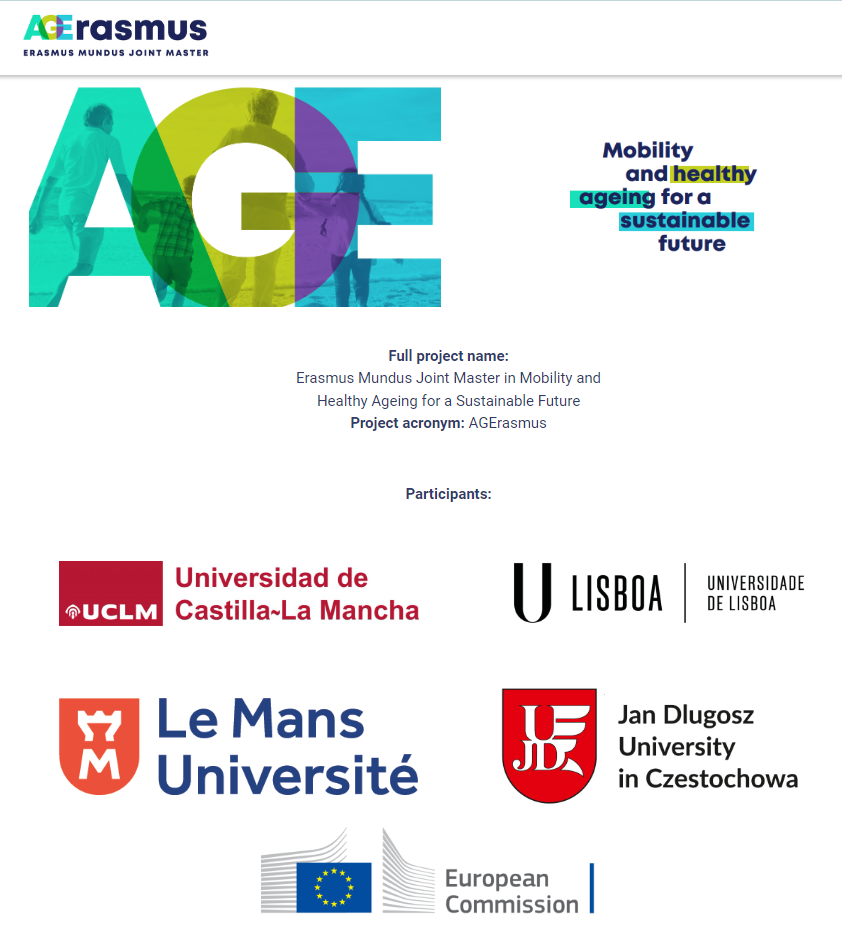The continuous increase in longevity is generating demographic changes that lead to profound transformations in European society and will represent a challenge for its future sustainability. Life expectancy and the percentage of elderly citizens will undoubtedly increase in the EU in the coming years. The contribution of all these citizens to society will largely depend on one factor: their mental and physical well-being.
The Healthy AGErasmus Master aims to prepare graduates who can meet the growing demand for highly qualified professionals to promote and develop interventions in the field of Active Ageing. Graduates of the Master will have the skills and competencies to work in multidisciplinary clinical and academic settings. The program will provide practical skills in exercise training and testing, geriatrics and gerontology, and socio-health issues in healthy and frail aging populations, and thus develop an understanding of the determinants of active and healthy aging as a whole. The project is developed by a consortium of five different EU universities (Spain, Denmark, France, Poland and Portugal), with lectures and seminars given by both academics of the highest scientific level and practitioners of exercise science in aging populations, geriatricians, gerontologists.
Students will benefit from a high-level scientific environment on all campuses and will have the opportunity to combine theoretical courses with practical activities such as participation in real research studies, work with clinical populations and training of elderly people in specialized port/community centers. In terms of career opportunities, graduates will be candidates for both doctoral degrees and positions in hospitals, nursing homes and specialized training centers for the elderly. In addition, internships provided by the partners will enable students to create connections that will ensure their further professional development.

Blended Intensive Programmes (BIP)
The IDEATE (Inclusion and Diversity Education through Applied Design Thinking for Equity) project consists of developing interdisciplinary training actions in Equality, Diversity and Inclusion (EDI) at the five partner universities in Cyprus, Germany, Spain, Italy and Sweden. The initiative aims to "generate an inclusive environment that can attract diverse talent and spread it to European partners through internationalisation" targeting both staff and students. All partner universities will conduct EDI workshops in their territories, encouraging the generation of innovative solutions. The results of these workshops will form the basis for the creation of the Equity, Diversity and Inclusion (EDI) Capacity Building Programme. The IDEATE project is part of the COLOURS European University Alliance, which links UCLM with eight other European universities in the construction of a single campus that has the support of a dozen regional innovation agents and is aligned with the Sustainable Development Goals (SDGs).
Challenge posed: Drinking water supply is one of the most important global challenges and is intensifying considerably as a result of climate change. In order to be able to use effluent water from wastewater treatment plants as an additional source of water for irrigation, some organic micropollutants, such as pharmaceutical residues, which would otherwise accumulate on agricultural crops or in the environment, must be removed.
Proposed solution: In order to reduce micropollutants, SERPIC will test a novel treatment technology for wastewater treatment plants. Nanofilters create a pollutant-free permeate stream which, after disinfection with chlorine dioxide, will be used for irrigation. The concentrate stream contains the pollutants, which are degraded by UV-stimulated electrochemical oxidation. The oxidants are generated with high efficiency in electrolysers equipped with diamond electrodes. A prototype plant in Ciudad Real will verify the suitability of treated water for irrigation on test fields.
Added value: Unlike previously proven treatment techniques, SERPIC technology offers the potential to achieve a higher degradation rate as well as improved sustainability through the use of on-site generated solar energy. Concepts are being developed for the transfer of the technology to other, particularly underdeveloped regions, including South Africa.